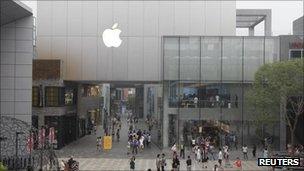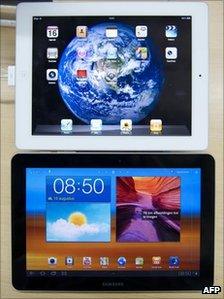Is Apple winning too often?
- Published
- comments

Apple has four stores in China which generate the most revenue of all its branches worldwide
Last week, right in the middle of the silly season when most people aren't paying attention, there were seismic events which changed the face of the technology landscape.
They saw one giant name in America's computing history - or at least its mobile division - swallowed up by another, and a firm with an even more prestigious past effectively giving up on personal and mobile computing.
And they left another computing Titan looking even more dominant.
Apple was not as busy as its rivals last week, but it still managed to hog a few headlines.
We found out for instance that, as well as having more money than the US government, it appears to be worth more than all of the banks in the eurozone put together.
But it was Google, with that takeover of Motorola Mobility, and HP, turning its whole business upside down, which were really making waves.
And while I'm sure Apple executives were watching carefully as their rivals strutted their stuff, it's hard to think they were worried.
Google's move on Motorola and its warehouse of patents appeared bold at first sight, offering the prospect of a more integrated Android ecosystem.
A week on it looks defensive, and hardly likely to produce the kind of end-to-end, software-to-stores operation that generates such huge margins for Apple.
And a share price which fell 10% over the week did not suggest that the market saw the Motorola bid as a stroke of genius.
HP's hyperactive Thursday, which saw it dump WebOS, buy the UK's Autonomy and announce plans to hive off its personal computing division will have been even less of a concern in Cupertino.
Apple executives - like the England cricket team - must be asking themselves "where did it all go so right?"
The iPad alternative
It's only 18 months since Steve Jobs told us that the iPad was part of a revolution that would take us beyond the PC - and now HP is not only agreeing, it's throwing in the towel.
In particular, the axing of its Touchpad tablet computer, just weeks after a hugely hyped launch, is not only a humiliating and expensive setback for HP, it threatens to sap the confidence of consumers in all rivals to Apple's device.
I'm not sure most casual buyers will distinguish between WebOS or Blackberry or Android tablets, seeing them all as just potential iPad alternatives.

The Samsung's screen is longer and narrower than its Apple rival
So if a product like the Touchpad can die within weeks who's going to want to invest in any of the other iPad killers?
The one tablet that might stand a chance is the Samsung Galaxy Tab 10.1, a device I've been using for the last few days.
It's very impressive - light, fast, with a great screen and a better camera than the iPad 2.
A real contender in other words - but there's a big but.
Apple is in the middle of a legal battle in a German court over the alleged similarities between the Tab and the iPad, which saw Samsung's device temporarily banned from most European countries.
The ban has been lifted, outside Germany at least, but the whole affair has not helped market the tablet.
Who will go out and buy an iPad rival if all they are hearing is that it's a copy of the original, and no cheaper?
Whatever the merits of Apple's case may be, patent and intellectual property disputes now appear to be harming the interests of consumers and innovators in the computing industry.
Steve Jobs and his company have enjoyed win after win over the last couple of years.
But many consumers - as well as rivals - may be hoping that on Thursday when the German court rules again on the copycat case, Apple suffers a rare defeat.